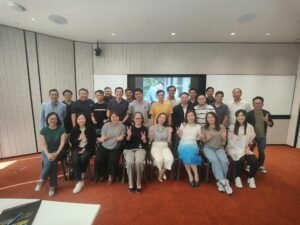Reinventing the wheel is a concept that may seem redundant, but in today’s rapidly evolving global landscape, the ability to adapt is critical. Technological advancements and economic shifts are reshaping industries at breakneck speed, demanding a focus on proactive engagement and continuous innovation.
Amidst this perpetual process of transformation, stories and examples of exceptional adaptability provide inspiration and guidance for navigating modern complexities.
RashmiPatel, Director of Global Talent Management at Red Hat, exemplifies this with her entrepreneurial spirit and dynamic approach. Her insights shed light on strategies for thriving amid uncertainty.
Embracing change fosters personal/organisational growth and groundbreaking technology advancements across fields. Rashmi’s experiences illustrate the profound impact of cultivating an entrepreneurial mindset in a world that demands constant technology evolution.
Let’s delve into how this mindset can be a powerful tool for businesses and anyone looking to reinvent the wheel themselves to not just survive but thrive in today’s rapidly changing environment.
Reinvent the Wheel in an Unpredictable World

The world we inhabit is one of constant flux, where change occurs at an unprecedented velocity that shows no signs of slowing. Each day brings new events that reshape industries, upend economies, and disrupt the very fabric of societies across the globe.
The recent consolidation within the tech sector, the shocking collapse of banking giants once thought too big to fail, and the meteoric rise of paradigm-shifting technologies like ChatGPT are mere glimpses into the dizzying unpredictability that now defines our era.
In the throes of such relentless change and upheaval, we are presented with a fundamental choice – to fixate on the perceived negatives of this tumultuous landscape, or to embrace an opportunistic mindset that seeks out the positive possibilities awaiting those willing to adapt.
The entrepreneurial spirit compels us toward the latter, encouraging us to view the world not as a minefield of challenges but as a fertile ground bursting with untapped potential to reinvent the wheel.
Be Entrepreneurial and Reinvent the Wheel in Your Work

Rashmi exemplifies this entrepreneurial DNA, a fundamental part of her being that she consciously infuses into her professional endeavours. At its core, having an entrepreneurial mindset means constantly pushing boundaries, questioning assumptions, and tirelessly seeking new ways to innovate and drive meaningful impact.
However, it would be a misconception to equate this spirit solely with the act of starting a new business venture. The true essence of being entrepreneurial transcends traditional definitions – it is a mindset, an approach to work and life that prioritises continual growth, adaptation, and the relentless pursuit of leaving an indelible mark.
It is the driving force that propels individuals to wake each morning daring to make their dent in the universe, irrespective of their location, chosen vocation, or career path or to reinvent the wheel.
Reinventing the Wheel for Future Leaders

As we navigate this unpredictable world order, it becomes imperative that we embrace and empower the rising generation of leaders – Generation Z. While past researchers and scholars may have assigned various labels and characteristics to this cohort, such attempts at categorization and definition hold increasingly diminished relevance in our dynamic present.
The time has arrived for Generation Z to boldly step forward and reinvent the wheel to tackle the new adventures and complexities that await. The world they inherit is fundamentally distinct from the one that came before, created and shaped by forces and currents unimaginable to previous generations.
To expect this new vanguard to approach challenges through an identical lens would be wrong, misguided and self-limiting.
Instead, we must actively create space for their unique perspectives, perspectives forged in the crucible of a rapidly evolving global landscape. We must listen to their voices, celebrate their creativity, and run alongside them as collaborative partners striving toward a shared vision of progress to reinvent the wheel.
In doing so, we harness the boundless innovative energy that is the hallmark of youth while providing the wisdom and experience garnered through lived challenges.
Only through this intergenerational synthesis, this merging of audacious vision with battle-tested resilience, can we hope to not merely withstand but thrive amidst the relentless unpredictability that defines our age.
For those able to amalgamate the entrepreneurial spirit with an openness to fresh perspectives, the opportunities awaiting are limited only by their own implementation and the scope of their ambition.
Reinventing the Wheel: Strategies for Embracing Change and Seizing Opportunities

- The Importance of an Entrepreneurial MindsetAn entrepreneurial mindset is crucial for navigating today’s rapidly changing landscape, encompassing innovation, risk-taking, proactively driving change, envisioning possibilities beyond current constraints, and being driven by a passion to solve problems and create impact across all aspects of life and work.This mindset involves constantly seeking new opportunities, having the courage to act despite uncertainty, and taking a proactive approach to change across professional and personal spheres.It requires making calculated decisions quickly based on limited information, blending intuition, experience, and critical analysis to thrive amidst uncertain conditions.Entrepreneurs proactively capitalise on the dynamism of the modern world, providing the flexibility to adapt nimbly and the foresight to seize emerging opportunities before they become obvious, unlocking new avenues for success across careers and lives in our fiercely competitive landscape.
- Embracing New OpportunitiesEntrepreneurs possess a unique mindset that embraces risks and uncertainties as essential elements for growth and innovation, thriving on the thrill of exploring uncharted territories with potential high rewards.They excel at identifying market inefficiencies, unmet consumer needs, and emerging trends, swiftly delivering innovative software solutions that resonate with future demands by anticipating where markets are heading based on their comprehension of industry dynamics, user behaviour, and technological advances.
- Adapting to Constant ChangeIn our era of perpetual change, the ability to create and adapt strategies nimbly while maintaining a steadfast core purpose is critical for achieving long-term success and impact.At the heart of strategic adaptability is a clearly defined organisational concept and mission that acts as a lodestar, providing coherence and alignment even as the operating landscape shifts rapidly – this core mission guides all decisions and strategic adjustments.For entrepreneurs and business leaders, it means continuously ensuring any new opportunity or initiative remains unified with the overarching goals of the brand or organisation rather than chasing transient pressures.While the foundational mission remains constant, an entrepreneurial mindset allows companies and individuals to stay agile and pivot their strategies and tactics in response to new market data, consumer needs, technological trends, and other environmental changes.This could take the form of adjusting product development approaches based on user feedback, adopting new tools that enhance efficiency, redefining service delivery models, and more. The key is possessing the creativity and flexibility to evolve methods without losing sight of the ultimate purpose.Entrepreneurs are adept at this balancing act, constantly learning and course-correcting while still advancing their final objectives.
- Overcoming Challenges in a Changing WorldThe entrepreneurial journey demands resilience, a bold long-term vision, and an unwavering commitment to persevere through difficulties marked by continual obstacles.A clear, ambitious vision mapping out the aspiration and direction is critical, providing the motivating force that propels entrepreneurs to consistently push the boundaries of innovation, even when exploring uncharted territory rife with potential setbacks and failures.Pursuing innovation inherently involves failures as new ideas and approaches are tested, but successful entrepreneurs view these not as definitive endpoints but as temporary obstacles and learning experiences that spur future breakthroughs.The true challenge lies in maintaining enthusiasm, self-belief, and persistence during arduous periods of experimentation and struggle, developing psychological tools to reframe trials as necessary steps in the overall journey.
- Thriving in a Rapidly Changing WorldTo not just survive but thrive amidst the flux of the modern world requires an adaptive, growth-oriented approach dedicated to continual learning and improvement.The growth mindset concept popularized by psychologist [Carol Dweck, is foundational for adaptability, involving relishing challenges as opportunities, persisting through setbacks, treating effort as the path to mastery, actively seeking feedback, and finding inspiration in the successes of others.In the entrepreneurial context, holding a growth mindset is especially vital as it encourages treating failures as pivotal learning moments, with each misstep providing insights into what doesn’t work and how to iterate better solutions.Building a feedback culture that proactively solicits and integrates feedback from external parties like customers, mentors, and subject matter experts is another pillar, serving as a grounding force by providing crucial outside perspectives that may be missed from an overly insular viewpoint.With the insights gained directly enhancing products, software developers, services, strategy, and fostering open communication, agility, and continuous refinement essential for sustained innovation.
- Reinvent the Wheel by Building a Community of Influence and GuidanceNetworks and communities are force multipliers that propel entrepreneurial success through support, collaboration, and diverse viewpoints.For entrepreneurs, professional networks act as support systems, sounding boards, and resource pools vital for navigating business complexities. Collaborations combine different skills and technologies to accelerate innovation.Drawing on ideas from varied cultural perspectives avoids insular thinking and results in more creative, inclusive, and globally-resonant solutions. Diverse viewpoints identify blindspots and enhance strategy.
- Effective Change Management StrategiesSuccessfully driving change within organisations requires proactively addressing human factors like resistance in a tailored, context-sensitive manner. Resistance is natural due to fear of the unknown. Effective leaders transform this through clear communication about the change’s purpose and benefits, inclusive processes, and comprehensive training.There is no one-size-fits-all solution or method. Deep understanding of an organisation or brand’s culture and dynamics guides the creation process of a customised strategy aligned with its traits and capacity for change.
- Redefining EntrepreneurshipEntrepreneurship today extends far beyond the definition of just the idea of reinventing the wheel and founding new companies, revolutionary ideas, and ventures – it exists and is a transformative force for societal progress.This entrepreneurial mindset of innovative problem-solving and invention is driving positive disruptions across sectors like education, healthcare, and public services to create sustainable community impacts.Entrepreneurs are at the forefront of pioneering and creating solutions to global challenges like climate change, poverty, and inequality. Their cross-border impact raises standards of living worldwide.
- Embracing Change as a Path to OpportunityAt its core, embracing change unlocks new pathways for personal growth, professional fulfilment, and actualization of one’s full potential. In a professional context, openness to change allows people to pursue roles aligning with passions, adopt new efficiency-enhancing methodologies, and progress their careers.Change challenges people to break free from constraints, adapt, and discover their latent talents. This pursuit of self-improvement and mastery unlocks the highest levels of human potential.
Reinventing the Wheel with Coping Strategies for Managing Change
Adapting to change, whether in the workplace or in personal life, can be stressful. It is crucial to develop coping strategies that can help manage this stress and make the process of change more manageable. Below are key techniques and approaches that can aid in this endeavour:
Stress Management

Effective stress management is vital to maintain both physical and mental health in times of change. Here are two practical techniques:
- Meditation: Regular meditation can significantly reduce stress levels by enhancing inner peace and mindfulness. It allows individuals to detach from chaos and approach situations with a calm mind, making thoughtful decisions rather than reactive ones.
- Time Management: Good time management can prevent the feeling of being overwhelmed, which often accompanies periods of change. Techniques to not waste time, such as prioritising tasks, breaking larger projects into manageable steps, and setting clear boundaries for work and rest can help maintain balance and reduce stress.
Emotional Intelligence

Developing emotional intelligence (EI) is essential for effectively navigating change. EI involves a set of skills that enable individuals to recognize, understand, and manage their own emotions and the emotions of others. Key aspects include:
- Empathy: Being able to understand and share the feelings of another person helps in navigating interpersonal dynamics more effectively during times of change. It fosters collaboration and support within a team or community.
- Resilience: Building resilience allows individuals to bounce back from setbacks and view failures as growth opportunities. Cultivating a positive outlook, maintaining flexibility, and managing emotions are all part of developing resilience.
Support Systems
Having a robust support system is invaluable when facing significant changes:
- Professional Networks: These can provide advice, share experiences, and offer practical help when dealing with similar challenges. They act as a sounding board and a resource point for new opportunities.
- Personal Relationships: Strong personal relationships provide emotional support, which is crucial during uncertain times. Friends, family, and mentors can offer encouragement, listen to concerns, and help keep things in perspective.
- Community Groups: Engaging with community groups can offer a sense of belonging and additional resources. These groups could be related to professional associations, hobby-based communities, libraries, or local support groups.

A trailblazer in humanising leadership and building high-resilience teams. As a former United Nations Peacekeeper, he leverages his high-stakes experience to redefine leadership dynamics. With a career distinguished by numerous accolades, Joseph now helps organizations thrive through a human-centric approach, enhancing performance, productivity, and workplace culture.








